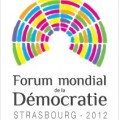 From October 5 – 11, 2012, the city of Strasbourg, France had its opportunity to shine at the center of the intellectual debate on democracy. The first World Forum for Democracy, organized by the Council of Europe and the Urban Community of Strasbourg, was entitled “Democracy on Trial: Between Old Models and New Realities”. It was inaugurated in the presence of United Nations Secretary General Ban Ki-moon, and 2011 Nobel Peace Prize laureate Tawakkol Karman.
From October 5 – 11, 2012, the city of Strasbourg, France had its opportunity to shine at the center of the intellectual debate on democracy. The first World Forum for Democracy, organized by the Council of Europe and the Urban Community of Strasbourg, was entitled “Democracy on Trial: Between Old Models and New Realities”. It was inaugurated in the presence of United Nations Secretary General Ban Ki-moon, and 2011 Nobel Peace Prize laureate Tawakkol Karman.
For three and a half days, the Palais de l'Europe hosted a thousand participants from around the world, for a plethora of debates in all formats, on the themes of democracy. The meetings were also a place to exchange experiences and good practices. Participants in the “Arab Spring” were invited to testify, although initially, simultaneous translation was not available. The hashtag #CoE_FWD allowed readers to follow the debates on Twitter.
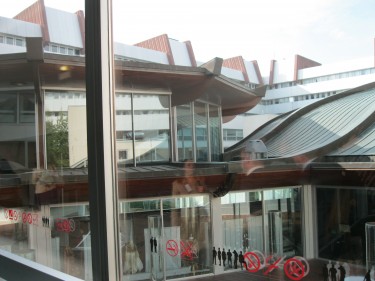
The interior of the Palais de l'Europe, Strasbourg
Being from Strasbourg, the author had not far to go, after proper registration, to attend the sessions. Here is a personal selection of quotations and links to resources.
Debates, roundtables, and workshops: a wealth of ideas
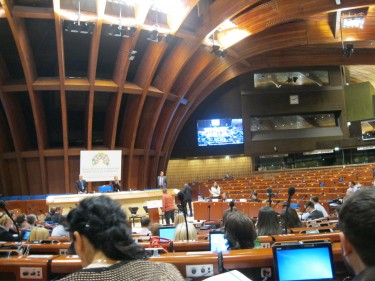
Conference on the theme of “Virtual Values? Democracy and New Social Networks”. World Forum for Democracy, October 8, 2012.
The author's favorite theme was “Virtual Values ? Democracy and New Social Networks” [fr], including the workshop “Internet, New Media, and Democratic (R)evolutions” [fr].
Some notes and questions, presented in aggregate:
- Citizen journalism, response to betrayal by traditional media companies, which are traded on stock exchanges, and are tools in the service of financial powers
– Technological neutrality of the Internet, and the inability of politicians to understand it: analogy with the advent of the printing press
– Freedom, immediacy, courage: “Should I go there?” “Are others going there?” Following passively in front of one's computer, or taking action
– Anonymous voices of social media – which thus can be manipulated, while the authorities have a public face
– In movements such as “The 132″ in Mexico: The risk of irrelevance and the difficulty of making decisions
– A third way, community media
– Information is still geographically localized, so publish guides to counteract official information
– After protests, use social media to support democratization
– In Senegal, the media workshop RFI warned the international community about potential tampering with elections, and the pressure that ensued has limited the scope of manipulation of the results
– Education for more effective use of citizen media
– Expressing oneself does not imply being heard, journalists still have their role
– Can liberal ideology tolerate difference?
– Who will require social media to fulfill their responsibilities?
– The ineffectiveness of censorship; for illegal content, prosecution is easier if it is not censored
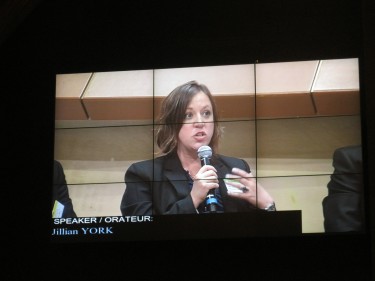
Jillian C. York, of Global Voices and the Electronic Frontier Foundation, at the debate on the responsibilities of media, and their potential to support democracy (October 9, 2012): “Censorship is pointless”.
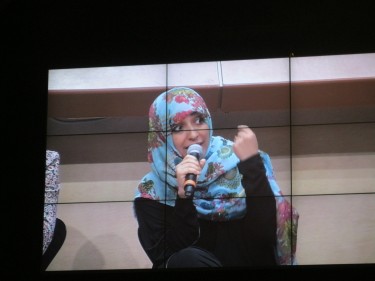
Tawakkol Karman, the 2011 Nobel Peace Prize laureate, at the debate on the responsibilities of medias, and their potential to support democracy (October 9, 2012): “Fundamentally, there is a right to receive information”.
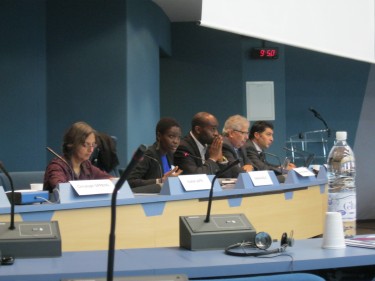
Meeting on “Immigration: Solidarity in Crisis?” at the World Forum for Democracy in Strasbourg, October 10, 2012
Links and selected highlights [fr]
- Non-governmental organization HRIC (Human Rights in China)
- Toolkit for intercultural dialogue, www.dialoguetoolkit.net
- Canadian information and activism site on immigration, BASICSnews.ca
- The example of the immigration policy of Portugal [fr] (welcomed by the OECD, [pdf])
- The organization ICORN (International Cities of Refuge Network), for writers and for those who are, in a larger sense, threatened
- The appeal of writers for peace [fr], by Boualem Sansal and David Grossmann
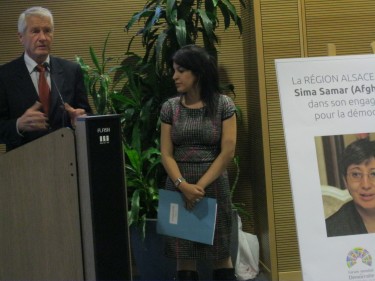
Tunisian blogger Lina Ben Mhenni receives the Alsatian Prize for Democratic Engagement
Additional activities
The aim of a larger audience had been proposed in meetings between writers and journalists, as well as a film festival, exhibitions, and various debates and conferences. Local and regional authorities provided the building, and in this context, the “Alsatian Prize for Democratic Engagement” [fr] was awarded to Tunisian blogger and activist Lina Ben Mhenni, who previously had already been honored in “Best of Blogs 2011″ [fr].
Was there democracy at the forum?
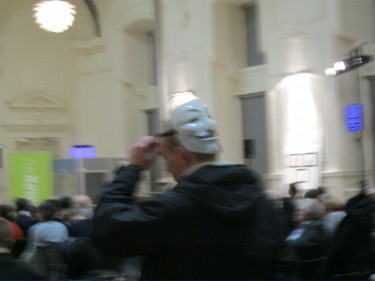
A protester at the meeting organized by “Le Monde”, on the subject of the “Arab Spring”. October 9, 2012
Communication about debate sessions was limited, and the mandatory online registration process was closed too soon, which probably excluded a larger number of people who would have been interested. This “very institutional” forum (according to opening remarks) was not a venue open to everyone [fr], but may have more closely resembled a Davos-style club discussion. There was also a small protest at the meeting organized by French newspaper “Le Monde”, on the theme of “The Arab Spring”.
Some people who had been approached about the Forum canceled their appearances : Tunisian President Moncef Marzouki [fr], a former medical student at the University of Strasbourg, cited scheduling conflict for his withdrawal. Guinean President Alpha Condé [fr], who was to have delivered the closing speech, probably preferred to avoid a demonstration which had been announced by his compatriots in the diaspora, who were outraged, and refused to allow him to present himself as a democrat.
On Tuesday the 9th, a demonstration by “Travellers” [fr] blocked the tram line, which connects the Palais de l'Europe to the Maison de la Région Alsace, for several hours.
Next year's meeting
The event is intended to take place annually. Has the challenge been met? To begin preparations earlier, should be one of the lessons learned from this first edition: within the nation of France, at institutions of the European Union, and among the common citizens.
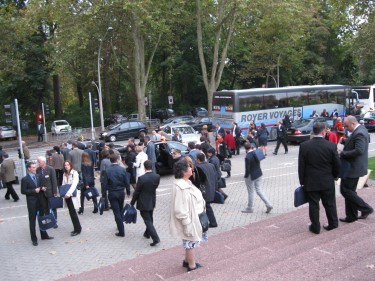
After a session of the Forum at the Palais de l'Europe

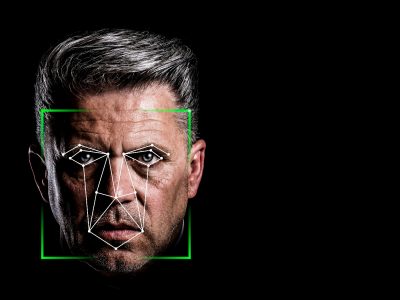
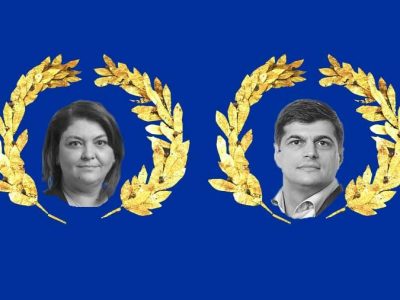
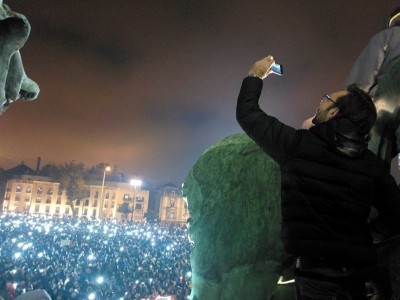
1 comment
Quelques impressions personnelles et phrases relevées lors de l’intervention de Mme Nawal El Saadawi (Egypt) jeudi 11 octobre lors de la session de clôture à Strasbourg.
Mme Nawal El Saadawi est un petit bout de femme dont la force d’élocution a conduit à une standing ovation à la fin de son discours. Elle explique en préambule son chemin de scientifique (médecin), ses années de détention en Egypte pour avoir critiqué le régime et son combat pour la justice. “I was fighting mainly for justice, the word “justice” is my philosophy”.
Mme Nawal El Saadawi s’étonne que durant ce forum le mot de justice n’ait pas été prononcé ou évoqué “I wonder why the word “justice” desappeared in this conference ?”, et voudrait comprendre comment le mot de démocratie reste associé aux mots de “market, globalisation” et non aux termes de justice, paix, élection, qui eux peuvent représenter une menace pour les pays “we live in a military system under the name of democracy”.
Mme Nawal El Saadawi parlera d’Israel et de l’Arabie Saoudite en ces termes : “Israeli is a jewish fundamentalist state, South Arabia is a muslim fundamentalist state”, we can’t continue like that, here in this room we are the elite about 20% of the world population as 99% personns is suffering”.
Mme Nawal posera beaucoup de questions relatives à la difficulté de faire vivre la démocratie dans un pays dès lors que de nombreuses sociétés sont patriarcales et que les individus ne vivent pas dans un environnement familial “démocratique”, “How democracy in the country, in the parliament if you don’t have damocracy at home ?Se pose alors la question de l’éducation, “we need real knowledge, the university give morcelled knowledge, we have to change, the education from childhood serve the power”.